Reformist Journalist Slams Critics Of Iran Attack On Israel

Mashallah Shamsolvaezin, a renown Iranian reformist journalist, has branded critics of the recent Iranian military strike against Israel as "defenders of the devil."

Mashallah Shamsolvaezin, a renown Iranian reformist journalist, has branded critics of the recent Iranian military strike against Israel as "defenders of the devil."
Shamsolvaezin expressed support for the attack in an interview with the Tasnim news agency, affiliated with the Islamic Revolutionary Guard Corps (IRGC), saying, "Unfortunately, some inside the country have become defenders of the devil, claiming that nothing has happened and that the missiles did not hit at all; they promote and reproduce 99 percent of the Israeli narrative, which is very dangerous."
His remarks coincide with increased pressure from the IRGC on the media and journalists to align with the regime's narrative. On Saturday, the Intelligence Organization of the IRGC urged the Iranian public to report any pro-Israel activities observed online.
Legal action has also been initiated against the Jahan Sanat newspaper and one of its journalists for allegedly "compromising national security" through their coverage of the operation against Israel.
Shamsolvaezin, 66, is a doyen of the Iranian media scene who edited several of Iran's foremost independent newspapers post-revolution, including Kayhan, Jame'eh, Neshat, and Asr-e Azadegan. He is also the spokesperson for the Iranian Committee for the Defense of Freedom of the Press and vice president of the Association of Iranian Journalists. The CPJ International Press Freedom Award winner in 2000, Shamsolvaezin has been to jail many times due to his journalism.
On the military front, Iran's retaliation against Israel involved over 350 drone and missile launches Saturday night, following an airstrike on April 1 that targeted the Iranian consulate in Damascus and killed several IRGC members, including two high-ranking commanders.
Despite the significant number of projectiles being intercepted by Israeli defenses and their allies, the Iranian regime has declared the operation a “success.” Iran's proxies in Iraq and Yemen also participated in the coordinated attack.
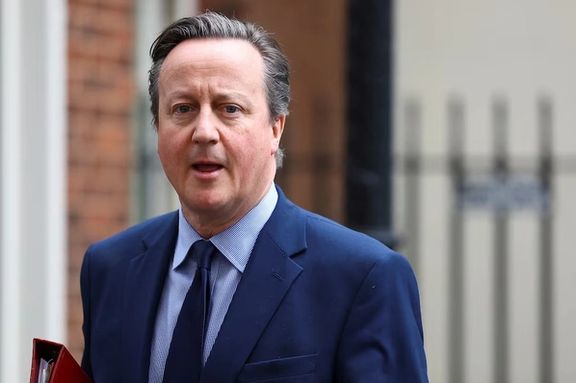
British Foreign Secretary David Cameron urged Israel not to retaliate after Iran's drone and missile attack, saying it should "think with head as well as heart" because Tehran's strike had been a near total failure.
The strike by more than 300 missiles and drones from Iran caused only modest damage in Israel as most were shot down by its Iron Dome defence system and with help from the US, Britain, France and Jordan. It followed a suspected Israeli airstrike on Iran's embassy compound in Syria on April 1.
"I think they're perfectly justified to think they should respond because they have been attacked, but we are urging them as friends to think with head as well as heart, to be smart as well as tough," Cameron told BBC TV.
He said he was urging Israel not to escalate the tensions in the Middle East.
"In many ways this has been a double defeat for Iran. The attack was an almost total failure, and they revealed to the world that they are the malign influence in the region prepared to do this. So our hope is that there won't be a retaliatory response," he told Sky News.
Cameron said Britain would also work with allies to look at imposing more sanctions on Iran, and it urged Israel to return its focus on agreeing a ceasefire with Iran-backed Hamas in the Gaza war.
(Reporting by Reuters)
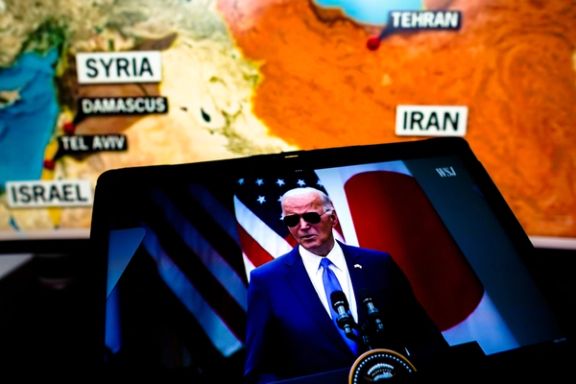
One day after Iran launched 350 missiles and drones against Israel, President Joe Biden warned Prime Minister Benjamin Netanyahu the US will not take part in a counter-offensive.
According to all evidence, 99 percent of Iranian projectiles failed to hit targets in Israel, mainly due to strong and multi-layered air defenses. The United States, Britain and Jordan also launched warplanes to shoot down incoming drones and cruise missiles.
However, as Netanyahu's war cabinet favors a retaliatory attack to re-establish deterrence against Israel’s sworn enemy, the US President tries to dissuade Israel from escalating the faceoff arguing that the failure of the Iranian attack is already a victory in itself.
President Biden has tiptoed around his support for Israel in recent weeks, after his strong stance immediately after the October 7 Hamas invasion. Critics say that the president should hold the Iranian regime responsible for all the mayhem in the region, should not offer any further sanctions waivers to Tehran and must re-establish deterrence against Iran.
The threat of open warfare erupting between the arch Middle East foes and dragging in the United States put the region on edge, triggering calls for restraint from global powers and Arab nations.
"The Middle East is on the brink. The people of the region are confronting a real danger of a devastating full-scale conflict. Now is the time to defuse and de-escalate," United Nations Secretary-General Antonio Guterres told a Security Council meeting called on Sunday in response to the strikes.
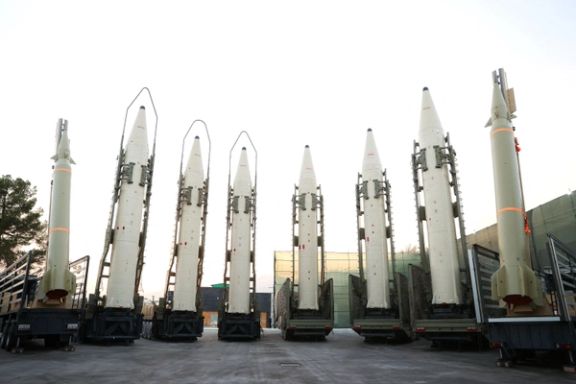
Deputy US Ambassador to the UN Robert Wood called on the council to unequivocally condemn Iran's attack.
"Let me be clear: if Iran or its proxies take actions against the United States or further action against Israel, Iran will be held responsible," he said.
Still, Biden told Netanyahu the US would not participate in any Israeli counter-offensive against Iran over the attack, a White House official said.
US Secretary of State Antony Blinken and Defense Secretary Lloyd Austin also spoke to counterparts including in Saudi Arabia, Turkey, Egypt and Jordan, stressing the need to avoid escalation, the importance of a coordinated diplomatic response, and emphasizing the US will continue to support Israel's defense.
Israeli officials said Netanyahu's five-member war cabinet favored retaliation in a meeting on Sunday, although the panel was divided over the timing and scale of any such response.
Two senior Israeli ministers signaled retaliation was not imminent and that Israel would not act alone.
"We will build a regional coalition and exact the price from Iran in the fashion and timing that is right for us," centrist minister Benny Gantz said ahead of a war cabinet meeting.
Defense Minister Yoav Gallant also said Israel had an opportunity to form a strategic alliance "against this grave threat by Iran."
Chief of staff of Iranian armed forces Major General Mohammad Bagheri said on television, "Our response will be much larger than tonight's military action if Israel retaliates against Iran," and told Washington that its bases could also be attacked if it helped Israel retaliate.
Iranian Foreign Minister Hossein Amir-Abdollahian said Tehran had informed the United States its attack on Israel would be limited and for self-defense and that regional neighbors had been informed of its planned strikes 72 hours in advance.
Turkish, Jordanian and Iraqi officials said on Sunday that Iran gave wide notice days before the attack, but US officials said Tehran did not warn Washington and was aiming to cause significant damage.
The leaders of the Group of 7 nations condemned Iran's attack and said they would work to stabilize the situation, warning in a statement that Tehran risked "an uncontrollable regional escalation."
With reporting by Reuters
Follow developments on Iran International's Live coverage of ongoing tensions between Iran and Israel.
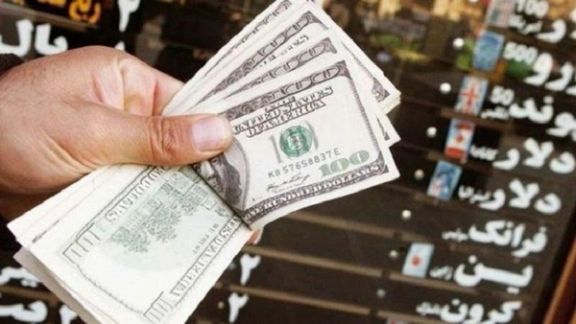
In the wake of heightened geopolitical tensions, the already battered Iranian currency, rial, has been thrust into a whirlwind of volatility.
Immediately after the Islamic Republic's recent attack on Israel commenced, the foreign exchange market witnessed an unprecedented surge, with the dollar breaching the 700,000 rials mark over the weekend.
The lower rial means more inflationary pressures in Iran, where the annual inflation rate already hovers around 50 percent for the past five years.
Amidst the chaos, state security agents have put heavy pressure on exchange brokers, threatening them with forced closures and arbitrary arrests, according to reports received by Iran International.
Local media and Telegram channels that Iranian people normally use to check open market exchange rates have been prohibited from listing currency rates and market developments.
Tehran Prosecutor's Office accused Jahan-e Sanat newspaper and an un-named economic reporter of having committed a crime "following the publication of materials aimed at the psychological security of the society and disrupting the economic atmosphere of the country after the successful and proud operation of the country's armed forces last night against the Zionist regime…," Mizan News Agency, a media outlet affiliated with the official state judiciary, reported.
Despite these restrictions, some Telegram channels persisted in reporting a downward trajectory in exchange rates, citing a selling rate of approximately 670,400 rials per dollar by Sunday afternoon. The pound, too, mirrored this trend, reaching a zenith of 870,500 rials before retracing to 840,880 rials later in the day.
Eventually, government-affiliated news agencies began acknowledging the market's downward trajectory, attributing it to the aftermath of the April 1 Israeli attack on the Islamic Republic's consular building in Damascus. On Sunday, Iran's semi-official Mehr news agency admitted that the dollar in the open market had reached new highs against the rial in the past few days.
However, discrepancies emerged between government-endorsed rates and those observed in the open market. The Iran Center for Exchange of Currency & Gold (ICE), part of the Central Bank of Iran (CBI), released figures significantly lower than official estimates. ICE announced the price of each dollar bill as 430,567 rials on Sunday, which is at least 250,000 rials lower than the rates announced even by the state news agencies.
The ramifications of the attack on Israel by the Islamic Republic extended beyond conventional markets, permeating into the realm of cryptocurrency. Following the attack announcement, Bitcoin experienced a significant eight percent decline in value, indicative of the broader impact of geopolitical unrest on digital assets.
As tensions persist and market fluctuations continue unabated, the resilience of the Iranian economy faces a stern test amidst the tumultuous geopolitical landscape.
Follow developments on Iran International's Live coverage of ongoing tensions between Iran and Israel.
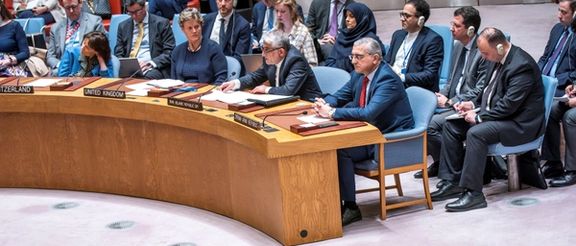
The UN Security Council held a meeting on the Middle East conflict a day after Iran launched an unprecedented attack on Israel while Western officials expect Israel to respond quickly.
The Sunday meeting followed the customary format of such gatherings, with UN Secretary-General Antonio Guterres cautioning members against exacerbating tensions through retaliatory measures against Iran, while the US and UK urged decisive actions to hold the Islamic Republic accountable for escalating the conflict to a new level.
Iran launched a swarm of explosive drones and fired missiles on Saturday in its first-ever direct attack on Israeli territory, risking a major escalation. The attack was in response to an Israeli strike on Iran's consulate in Syria on April 1 that killed top Revolutionary Guards commanders and followed months of clashes between Israel and Iran's regional allies, triggered by the war in Gaza. The bloody crisis started on October 7 when Iran-backed Islamist group Hamas invaded Israel, killing 1,400 people and taking about 240 hostages.
Guterres told member states that the UN charter bars the use of force against the territorial integrity or political independence of any state as he also condemned Iran's attack on Israel. "The Middle East is on the brink. The people of the region are confronting a real danger of a devastating full-scale conflict. Now is the time to defuse and de-escalate," Guterres told the meeting, which was called after Iran's attack.
Robert Wood, deputy US ambassador to the UN, called on the 15-member body to unequivocally condemn Iran's attack, as he said the Security Council has an obligation to not let Iran's actions go unanswered.
"In the coming days, and in consultation with other member states, the United States will explore additional measures to hold Iran accountable here at the United Nations," he said, without providing specifics. "Let me be clear: If Iran or its proxies take actions against the United States or further action against Israel, Iran will be held responsible."
The Wall Street Journal cited three Western officials as saying that Israel could soon respond to Iran’s Saturday attack, noting that the US won't take part in any such offensive operation. "We are not going to participate in any offensive operations against Iran," an official said.
Israel's war cabinet met Sunday but did not say how it would respond to the broad aerial attack from Iran overnight. Some Israeli politicians are calling for a "crushing attack."
Israel's ambassador to the United Nations, Gilad Erdan, accused Iran of violating international law at the meeting and played a video on a tablet that he said showed Israel's interception of Iranian drones above Jerusalem's Al-Aqsa mosque compound, one of Islam's holiest sites.
"Here, you can look at it," he gestured with the tablet and told the Iranian ambassador, who was also seated in the Security Council chamber. Erdan called on the Security Council to condemn Iran, reimpose sanctions and designate Iran's Revolutionary Guards a terror organization.
“Iran’s strategy has been crystal clear: arm, fund, and train terror proxies across the globe, to carry out Iran’s murderous scheme of domination. But today, the mask of Iranian deniability has been removed. No more hiding and no more bluffing. No more shirking of responsibility. Iran has attacked Israel from its own sovereign territory – publicly and proudly. The mask is off. Iran, the number-one global sponsor of terror, has exposed its true face as the destabilizer of the region and the world. And now – right now – is when the world must stop ignoring Iran’s crimes and take action.”
"The snooze button is no longer an option. The only option is to condemn Iran and utilize every means necessary to make them pay a heavy price for their horrible crimes," Erdan told the meeting.
Iran's UN ambassador, Amir Saeid Iravani, said his country's action was necessary and proportionate, and he said that while Tehran does not seek an escalation or war in the region and has no intention of engaging in conflict with the US, it reaffirms its right to defend itself.
"If the US initiates military operations against Iran, its citizens, or its security and interests, Iran will use its inherent right to respond proportionately," he said.
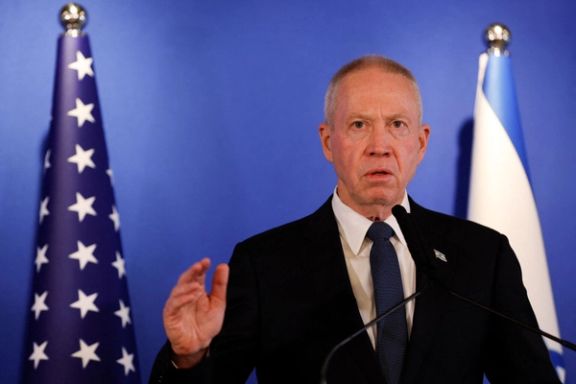
Israeli Defense Minister Yoav Gallant has said that Israel may have to form an alliance to be able to stand against Iran.
His comments come after the successful joint defense with US, UK and Jordanian air forces against a drone and missile assault by Iran overnight on April 13-14.
In a statement released on Sunday, Gallant detailed how the attack had been fought off with the help of the United States and other allied nations.
According to him, the aggression is a critical juncture for Israel to consider more collective security measures.
"We have an opportunity to establish a strategic alliance against this grave threat by Iran which is threatening to mount nuclear explosives on these missiles, which could be an extremely grave threat," he stated.
Earlier, Gallant outlined the scale of the attack on Israel, noting that "The State of Israel was attacked with hundreds of missiles and [unmanned aerial vehicles], and the [Israel Defense Forces] thwarted this attack in an impressive manner."
The minister stressed the importance of being prepared for any possible future scenarios.
Gallant's words came in a broader response from the Israel war cabinet, comprising himself, Prime Minister Benjamin Netanyahu, and Benny Gantz, which is tasked with deciding Israel's tactical response to the Iranian threat.
Speaking to the nation on Saturday night, Netanyahu highlighted Israel's preparedness to face Iran in direct combat and noted that they were ready for “any scenario, defensively and offensively.”
"Whoever harms us, we will harm them. We will defend ourselves against any threat and will do so level-headedly and with determination," he noted.






